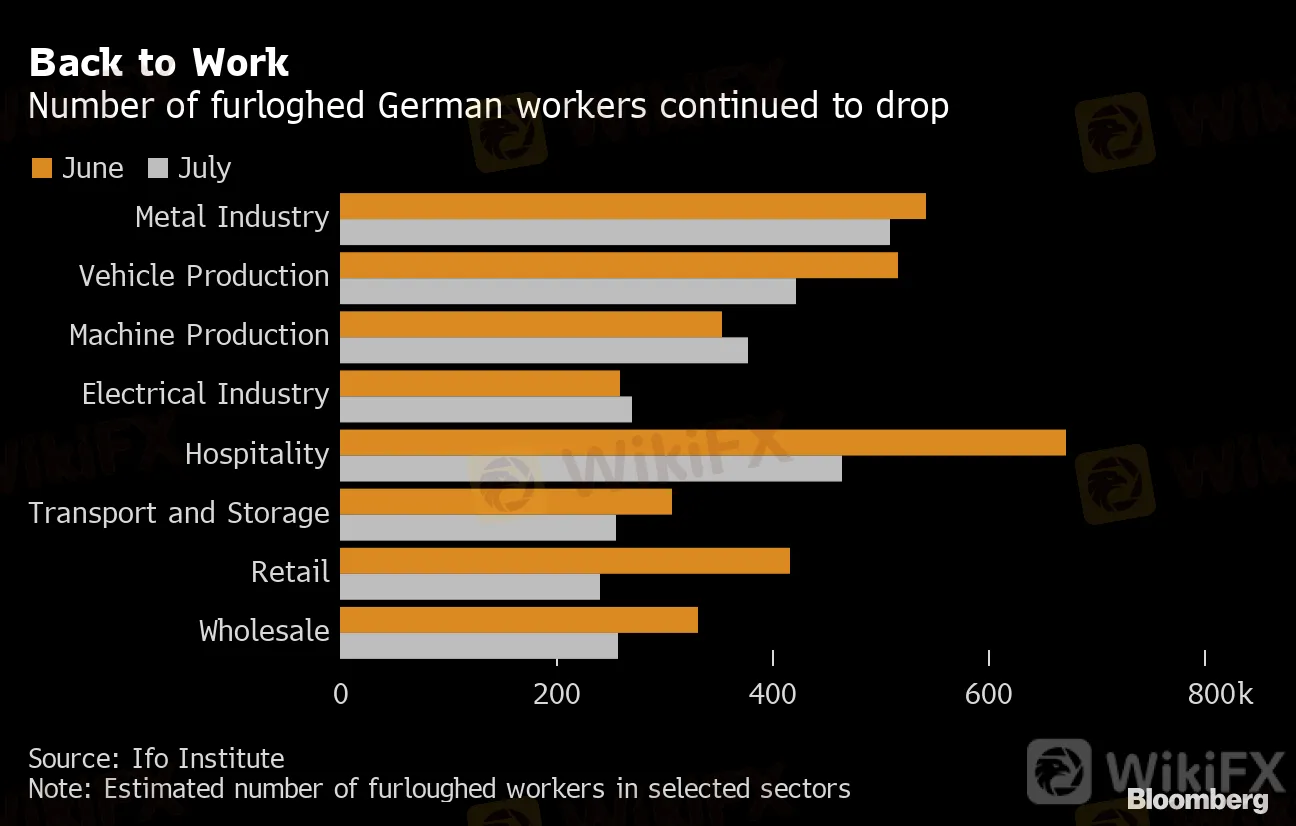简体中文
繁體中文
English
Pусский
日本語
ภาษาไทย
Tiếng Việt
Bahasa Indonesia
Español
हिन्दी
Filippiiniläinen
Français
Deutsch
Português
Türkçe
한국어
العربية
German Factory Orders Surprise as More Workers Move Off Furlough
Abstract:SHARE THIS ARTICLE ShareTweetPostEmailGermany progressed in its recovery from its record slump, wit
SHARE THIS ARTICLE
Share
Tweet
Post
Germany progressed in its recovery from its record slump, with manufacturing orders rising much stronger than forecast in June and the number of workers on government support programs diminishing.
Having shrunk the most in at least half a century in the second quarter as a result of restrictions imposed to control the Covid-19 outbreak, Germanys economy is now showing signs of bouncing back more quickly than other euro-area countries.
Industrial orders increased 27.9%, climbing for a second month, data showed on Thursday. The catchup process was particularly pronounced for investment goods, and the Economy Ministry said demand is already at 90.7% of the level recorded at the end of last year.
Meanwhile, the Ifo Institute reported that the number of people working reduced hours under a program known as Kurzarbeit in German fell to 5.6 million last month, down from 7.3 million in May. The drop was especially strong in hospitality and retail, after restaurants and shops reopened.
The euro was trading near a two-year high after the data were published, and stood at $1.1842 at 10:37 a.m. in Frankfurt.
{12}
Germany‘s recovery so far has been primarily driven by domestic demand, with orders from abroad lagging behind. Given the country’s export focus, thats raised questions about how sustainable the upturn will be.
{12}
European Central Bank Chief Economist Philip Lane has cautioned against excessive optimism about the euro areas rebound. A less-bad-than-expected drop in activity in the second quarter may mean a “less-steep step up” in the following three months, he said, adding that a renewed increase in coronavirus infections risks dampening consumer spending and business investment.
Back to Work
Number of furloghed German workers continued to drop
Source: Ifo Institute
Note: Estimated number of furloughed workers in selected sectors
{21}

Germanys flagship car industry -- already struggling before the pandemic -- has been severely hit by the crisis. BMW AG recorded its first quarterly deficit since 2009, while Volkswagen AG lost 2.4 billion euros ($2.9 billion) and cut its dividend. Daimler AG argued it had weathered the worst but still needs to slash about 20,000 jobs.
{21}
{777}
Reports from IHS Markit this week also showed European companies made further cuts to their workforce last month.
{777}
— With assistance by Harumi Ichikura, and Kristian Siedenburg
Disclaimer:
The views in this article only represent the author's personal views, and do not constitute investment advice on this platform. This platform does not guarantee the accuracy, completeness and timeliness of the information in the article, and will not be liable for any loss caused by the use of or reliance on the information in the article.
WikiFX Broker
Latest News
Good News Malaysia: Ready for 5% GDP Growth in 2025!
How to Automate Forex and Crypto Trading for Better Profits
Is the stronger dollar a threat to oil prices?
Rising Risk of Japan Intervening in the Yen's Exchange Rate
How Far Will the Bond Market Decline?
U.S. to Auction $6.5 Billion in Bitcoin in 2025
Standard Chartered Secures EU Crypto License in Luxembourg
Trading Lessons Inspired by Squid Game
Is Infinox a Safe Broker?
How Did the Dollar Become the "Dominant Currency"?
Currency Calculator






